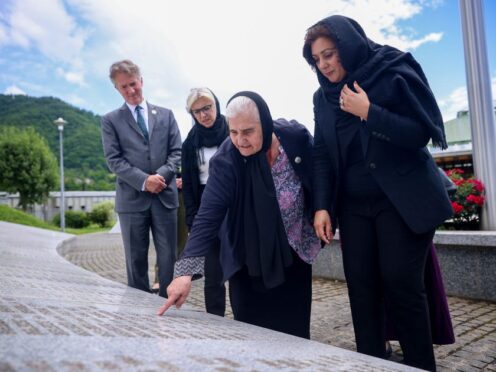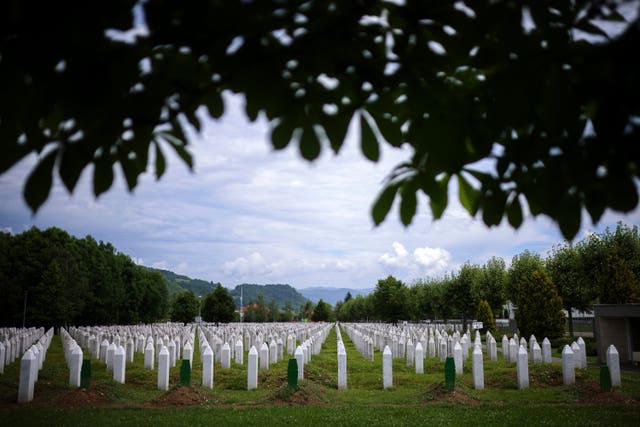
The United Nations approved a resolution on Thursday establishing an annual day to commemorate the 1995 genocide of more than 8,000 Bosnian Muslims by Bosnian Serbs, a move vehemently opposed by Serbs who fear it will brand them all as “genocidal” supporters of the mass killing.
The vote in the 193-member General Assembly was 84-19 with 68 nations abstaining, a reflection of concerns among many countries about the impact of the vote on reconciliation efforts in deeply divided Bosnia.
The resolution designates July 11 as the “International Day of Reflection and Commemoration of the 1995 Genocide in Srebrenica”, to be observed annually starting in two months.
The resolution, sponsored by Germany and Rwanda, does not mention Serbs as the culprit, but that did not stop the intense lobbying campaign for a “no” vote by the Bosnian Serb president, Milorad Dodik, and the populist president of neighbouring Serbia, Aleksandar Vucic.

On July 11, 1995, Bosnian Serbs overran a UN-protected safe area in Srebrenica. They separated at least 8,000 Muslim Bosniak men and boys from their wives, mothers and sisters and slaughtered them. Those who tried to escape were chased through the woods and over the mountains around the town.
The Srebrenica killings were a bloody climax of Bosnia’s 1992-95 war, which came after the breakup of the then nation of Yugoslavia unleashed nationalist passions and territorial ambitions that set Bosnian Serbs against the country’s two other main ethnic populations, Croats and Muslim Bosniaks.
Both Serbia and Bosnian Serbs have denied that genocide happened in Srebrenica although this has been established by two UN courts.
Mr Dodik, who is president of Republika Srpska, the Serb part of Bosnia which comprises about half its territory, said on Wednesday on X, formerly Twitter, that the UN resolution is being forced on the country by supporters of Muslim Bosniaks and that it will split up the country.
He suggested his government would secede from Bosnia if the resolution were to pass.
Mr Dodik has made several such threats in the past to have the Serb-controlled territories secede from Bosnia and join with neighbouring Serbia. He and some other Bosnian Serb officials are under US and British sanctions partly for jeopardising a US peace plan that ended the Bosnian war.
The final draft of the resolution added a statement reiterating the General Assembly’s “unwavering commitment to maintaining stability and fostering unity in diversity in Bosnia and Herzegovina.”
The determination in 2007 by the International Court of Justice, the UN’s highest tribunal, that the acts committed in Srebrenica constituted genocide, is included in the draft resolution. It was Europe’s first genocide since the Nazi Holocaust in the Second World War, which killed an estimated six million Jews and people from other minorities.
Germany’s UN Ambassador Antje Leendertse said last week that there is an official UN commemoration of the 1994 Rwanda genocide on April 7 every year — the day the Hutu-led government began the killing of members of the Tutsi minority and their supporters. The draft resolution aims “to close the gap” by creating a separate UN day “to commemorate the victims of Srebrenica”, she said.
Menachem Rosensaft, the son of Holocaust survivors who is an adjunct professor at Cornell Law School, told The Associated Press on Wednesday that designating July 11 as the official day of remembrance for the Srebrenica genocide “is a moral and legal imperative”.
The slain Muslim Bosniaks deserve to have their deaths and the manner of their deaths commemorated and Srebrenica was supposed to be a safe area but was abandoned by Dutch UN peacekeepers, leaving the Bosniaks who sought shelter there “to be murdered on the UN’s watch,” Mr Rosensaft said.
Richard Gowan, UN director of the International Crisis Group, called the timing of the vote “unfortunate, given allegations that Israel is pursuing genocide in Gaza”,
“The vote will be an opportunity for more political theatre,” he told AP. “I expect Russia and China will make a great point of asking why the US and European governments are concentrating on a massacre in the 1990s rather than killings in Gaza today.”

Enjoy the convenience of having The Sunday Post delivered as a digital ePaper straight to your smartphone, tablet or computer.
Subscribe for only £5.49 a month and enjoy all the benefits of the printed paper as a digital replica.
Subscribe